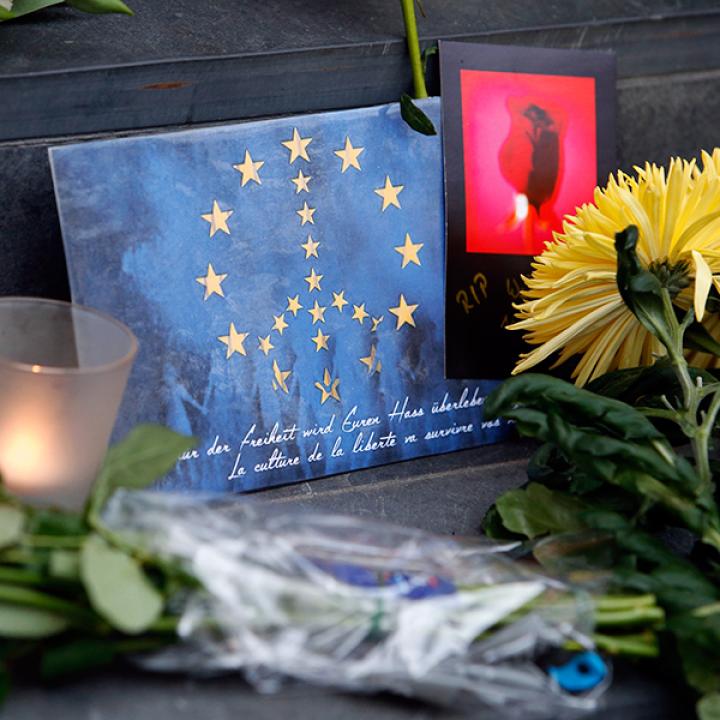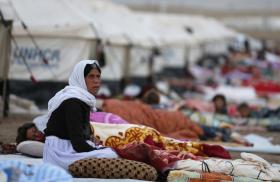
- Policy Analysis
- Counterterrorism Lecture
Preparing to Counter ISIS 2.0: European CT Efforts Since Charlie Hebdo

Part of a series: Counterterrorism Lecture Series
or see Part 1: U.S. Efforts against Terrorism Financing: A View from the Private Sector
Watch the European Union's counterterrorism coordinator discuss plans to combat the Islamic State after the caliphate falls.
On June 23, 2017, Gilles de Kerchove addressed a Policy Forum at The Washington Institute. A senior Belgian official and the EU counterterrorism coordinator, Kerchove previously served as director of justice and home affairs in the Council Secretariat of the European Union from 1995 to 2007. Following are his prepared remarks.
Daesh (aka the Islamic State) is being pushed out of vast swathes of the territory it once controlled and, despite propaganda proclaiming otherwise, the group's military defeat in Iraq and Syria is inevitable. But defeat in traditional military terms will not spell the end of the threat we face on both sides of the Atlantic.
Our enemies are adapting to their new reality and, as the physical caliphate collapses, the virtual caliphate is rising from the flames. ISIS 2.0 will not be beaten by military might alone. The European Union and its member states are working hard to tackle this increasingly hidden, often crude, and unpredictable threat.
In January 2015, the Charlie Hebdo attacks in Paris marked a step change in European counterterrorism cooperation. Just one month after the attack, European heads of state and government met in Brussels and committed to an ambitious blueprint for enhanced cooperation across three broad policy areas: (1) ensuring the security of citizens; (2) preventing radicalization and safeguarding values; and (3) cooperating with our international partners. Impressive progress has been made by the EU and its member states across all three portfolios.
Further still, recognizing the political importance of the issue, the president of the European Commission has appointed a Commissioner for the Security Union, Sir Julian King, in order to bring greater political focus to the commission's efforts.
Our enemies should be under no doubt that our collective capability and our collective resolve to defeat them and their heinous ideology are infinitely stronger than theirs. Last night (June 22), the heads of state and government of the EU met again in Brussels and committed to yet further cooperation and even greater ambition in this regard.
Ensuring the Security of Citizens
We have seen an unprecedented leap forward in information exchange, interoperability, and in police and intelligence cooperation and capability. This has taken place both through EU agencies such as Europol and its new European Counter Terrorism Centre (ECTC) and through structures outside of the EU such as the Counter Terrorism Group (CTG).
The creation of new capabilities through legislation such as the Passenger Name Record (PNR) directive is making powerful new tools available across the Union. PNR, for example, allows member states to process data provided by airlines in order to identify high-risk travelers. PNR is no silver bullet, but it can disrupt our adversaries from traveling freely across Europe by helping to identify both known and unknown terrorist fighters traveling to or returning from conflict zones.
Other tools such as the Schengen Information System II (SIS II) have been enhanced and hold the details of thousands of foreign terrorist fighters. This provides further opportunities to identify, disrupt, or monitor terrorists moving throughout the EU. It allows for richer intelligence pictures to be generated and a framework for efficient cooperation at the border. For example, one case saw a foreign terrorist fighter trying to return to the Netherlands through Turkey and Germany. The individual was identified through SIS II, and Dutch authorities were able to stop him immediately for questioning upon arrival at Schiphol Airport.
The legislative response to the threat has been measured and effective. Laws have been tightened across the EU to criminalize travel for terrorist purposes, to tackle terrorist finance, and to make it far more difficult for terrorists to acquire firearms and explosive precursors and detonators.
Borders have been made more secure, and mandatory checks -- at the external border -- of all persons, including EU citizens, have been introduced, subject to closely monitored transition periods.
These collective efforts, among numerous others, have clearly had a positive effect on the security of our citizens. The trend toward cruder methods of attack remains a challenge, but it does indicate that firearms and explosives have indeed become harder to access. The change in the numbers of Europeans traveling to the conflict zone can also, in part, be attributed to the steps the EU has taken. The numbers are stark: Those Europeans traveling to join Daesh reached almost 4,800 by the end of 2015. In 2016, fewer than 100 EU residents were able to reach Syria and Iraq, and little more than a few dozen have been successful in 2017.
Preventing Radicalization and Safeguarding Values
The EU has been leading efforts in the virtual space since July 2015 through the creation of Europol's Internet Referral Unit (EU IRU). This unique multilingual capability has been working to reduce terrorist and extremist online propaganda on global platforms and to provide operational support to high-profile investigations. During its first dedicated two-day operation, the team analyzed and actioned over 1,800 pieces of Daesh- and al-Qaeda-affiliated content in nine different languages hosted by thirty-five different platforms.
The creation of the Internet Forum, which sees EU interior ministers and Internet companies working together to tackle the online threat, presents a significant opportunity to tackle ISIS 2.0. We have built strong foundations and ambition is high, but a step change is indeed necessary to meet the scale of the challenge. The Internet companies, led by Facebook, are already working on technical innovations to achieve this, including methods of detecting terrorist content automatically. The path to achieving this will not be easy, but it must be achieved if we are to protect our citizens and, crucially, our children.
The Radicalisation Awareness Network (RAN) connects over 2,400 frontline practitioners across the EU working to counter radicalization across all sectors. These deep subject matter experts (including on the education, health, and prison sectors) bring their experience and knowledge together to learn from each other and to develop actionable recommendations for policymakers. The network has been strengthened with €25 million additional funding over four years and established as a Centre of Excellence for the EU.
Work to support member states in tackling prison radicalization is under way with funding made available for rehabilitation and deradicalization programs, risk-assessment tools, and training.
With an eye to the future, work to improve education and youth-employment prospects is also an essential pillar of our work in this area. Programs such as Erasmus+ have been strengthened to foster inclusion and promotion of fundamental values. Significant funding has been made available for new policies and projects and for grassroots initiatives.
International Cooperation
Political and security cooperation with our partners in the region is at an all-time high and is more important than ever. We have deployed counterterrorism experts to EU delegations in high-priority partner countries and are developing comprehensive CT-assistance programs with countries such as Tunisia, Lebanon, and Jordan. Our EU agencies, including Eurojust, Europol, Frontex, and the European Police College (CEPOL), have been reinforced in order to support these programs.
And of course, it goes without saying that the United States is a crucial partner in all of our activity. We have concluded a PNR agreement with the United States and maintain highly effective access to the Terrorist Finance Tracking Program (TFTP) through requests made by Europol. The TFTP has proven a very valuable tool in the investigations into the recent terrorist attacks in Europe. There has been a considerable rise in requests, which resulted in a high number of intelligence leads -- more than 35,000 since the EU-U.S. TFTP Agreement in 2010 (more than 80 percent of those leads were provided in 2015 and 2016 in reaction to the terrorist attacks). Almost half of these relate to foreign fighters. More broadly, the level of information exchange through Europol and Eurojust and, of course, bilaterally with the member states is essential to our tackling the threat both in the United States and Europe and around the world.
Conclusion
While some attacks have penetrated our collective defenses with tragic consequences, we can be certain that our collective actions have contributed to numerous plots being disrupted, and vulnerable citizens have been prevented from being radicalized or traveling for jihad in the battlefields of Syria or Iraq.
Crucially, if we are to face down the threat of ISIS 2.0, we will need to scale up our efforts to tackle the virtual caliphate. The EU is well positioned, but we will need our international partners and, most important, the online industry to step up to the mark. As the British prime minister said just this month, enough is indeed enough. The Internet giants, who are such a central part of our societies, must bring their full capabilities to the table and help us safeguard our children and vulnerable citizens from false religious narratives and from violent extremism.
We have achieved a significant amount in a very short period of time, but there remains much to do. We must act strategically and we must act together to share the burden. Our priorities for tackling ISIS 2.0 must now include defeating its agents in the virtual caliphate and ensuring the safety of our citizens in the face of the increasingly unpredictable and hidden acts of terrorism that the virtual caliphate inspires. We must also develop new methods of analyzing big data and using artificial intelligence to assist us. Finally, we would be foolish to simply focus on the short to medium term. True success against ISIS 2.0 will require the defeat of its delusional ideology and the victory of our shared values. The European Union will remain in support of our member states and our international partners for the long haul. Together, we have seen graver challenges than this before and triumphed in the face of them.






